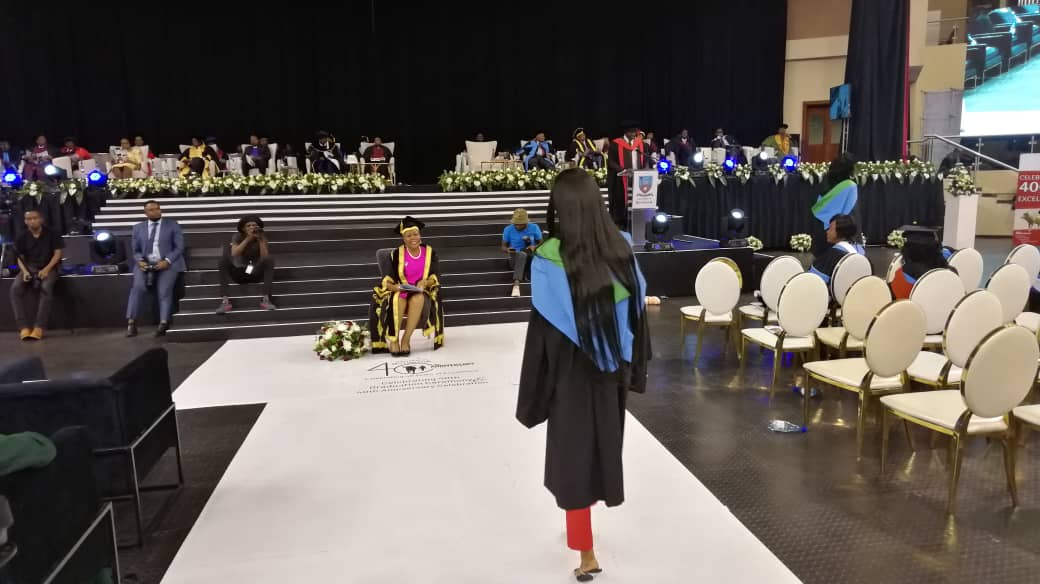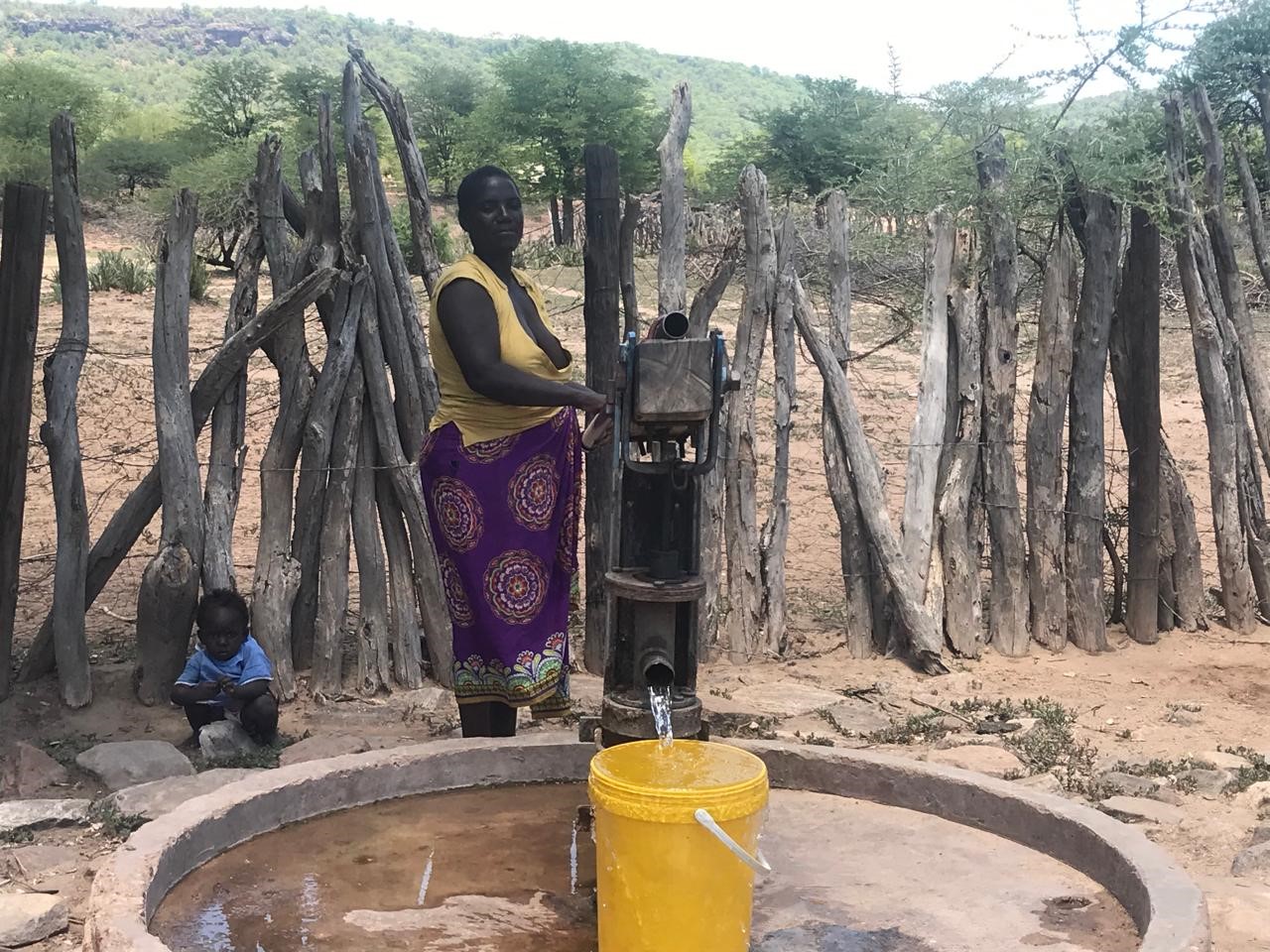
Tidimalo Tities, a Bachelor of Media Studies (General) graduate takes a bow before Chancellor of the Universitry Tebeleo Seretse last week Friday 21st of October 2022 during UB's 40th graduation ceremony
The Pan Afrikanist Watchman
The University of Botswana is on the cusp of joining those universities that have been ranked among the world’s top 1,000 universities and entry into the top tier of global universities.
This feat follows UB’s commendable ranking in the latest results of the Times Higher Education (THE) World University Rankings 2023 which ranks universities in accordance with international academic benchmarks.

A press release from the UB’s Department of Public Affairs shows that this year was the largest ranking undertaken in the 19-year history of THE rankings with a record 2,325 universities from 111 countries submitting applications to be ranked.
Incredibly, UB has maintained its position as the top ranked university in Botswana and is now sitting at 1018 out of 1,799 universities that were ranked from 104 countries
Five hundred and twenty-six (526) universities were excluded as they failed to meet the eligibility criteria.
As a continent, Africa witnessed a dramatic improvement with a record total of 97 universities being ranked with 25 being ranked for the first time. Sub-Saharan Africa (SSA) experienced a significant improvement with 16 new universities being ranked for the first time.
At 23rd position, the University of Botswana climbed the Sub-Saharan rankings, improving on the previous two years’ performance and outperforming for the first time the University of South Africa (UNISA) as well as 16 other Sub-Saharan universities which achieved a lower ranking than UB.
With the majority of Sub-Saharan Africa’s ranked universities coming from two populous countries, Nigeria, and South Africa, UB’s ranking is commendable as it represents Botswana’s ability as a small state to compete and be visible in Sub-Saharan Africa.
Breaking down the University of Botswana performance, research output continued its steady increase over the last three years signalling the progress being made towards transforming UB into a research-based university.
The greatest area of improvement in UB was citation which measures the times a piece of published research is cited and is a key indicator of research quality and influence.
Continuing its impressive rise since it commenced being ranked by the THE, UB’s citations have increased by a dramatic 198 percent over the period 2021-2023, from a score of 13 in 2021 to the current score of 41.
Speaking last week’s at the UB’s 40th graduation ceremony in Gaborone, President Dr Mokgweetsi Masisi hailed the university’s research and innovation initiatives, which he said had been instrumental in the country’s efforts to stem the tide of the Covid-19 pandemic.
Not only did UB produce sanitisers and face shields, it also collaborated with Botswana Institute of Geomatics to develop three computer software tools that helped the Ministry of Health and Wellness to manage and monitor the pandemic through a web map visualisation and live tracking dashboard.
Masisi explained that these tools allowed the ministry to record data and illustrate real tie trends of Covid-19 cases in Botswana. In addition, UB has cemented its place as an innovation hub with such projects as the production of biodiesel from used cooking oil and plant materials, and the harnessing of solar energy.
The UB has also collaborated with the Botswana Vaccine Institute to research on a Foot and Mouth Disease (FMD) vaccine that is appropriate for Southern Africa.
Botswana suffers from regular outbreaks of FMD, which inevitably compromise the country’s beef exports to lucrative European markets, as well as distract people’s livelihoods seeing that most Batswana depend on cattle rearing.
The University of Botswana was established in 1982 and has to date produced more than 84, 000 graduates that have contributed immensely to the country’s socio-economic and political development.
The UB’s turnaround is largely attributed to the programmes and strategy introduced under Vice Chancellor Professor David Norris. When he arrived in 2016, the university was not ranked and at a point of collapse.
With the support of his dedicated team Prof Norris has consistently harped on the urgency of transforming the UB into a centre of excellence that impacts society and the world with its research and innovation outputs.
This was evidenced by the UB’s showcasing of nine research projects at this year’s prestigious DubaiExpo2020.
The researches showcased include the Production of biodiesel and by-products using local materials by Professor C. Ketlogetswe of the Faculty of Engineering and Technology; Automated acoustic detector for spotted hyena caollars, by Dr Emily Bennitt; Hi-tech GPS collars to study movements of herbivores, by Dr Emily Bennitt of the Okavango Research Institute ORI); and Steroid production from fungi isolated from hypersaline environment for biotechnological applications, by Dr. Daniel Loeto, Faculty of Science.
The others were Vaccine development for Lumpy Skin Disease in Cattle, and Rapid diagnostic test kit for detection of Lumpy Skin Disease in cattle, by Professor S. Wata Mpoloka, Faulty of Science; Innovative solutions for assessment and monitoring of water in Lake Ngami in the lower Okavango Delta, by Dr. Kelebogile Mfundisi, Okavango Research Institute; Pre-surgical planning and medical device fabrication, by Dr. Shathani Nkhwa, Faculty of Medicine and Blood groups approach to HIV/AIDS vaccine development and treatments, by Dr. Modisa Motswaledi, Faculty of Health Sciences.
This clearly demonstrates that UB is directly contributing to the establishment of Botswana’s Knowledge Economy and has made notable progress towards its vision of transforming into a distinctive centre of excellence in Botswana, Africa and globally.









